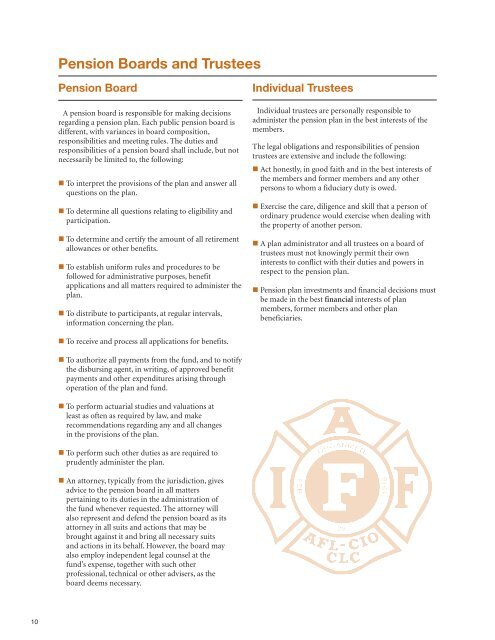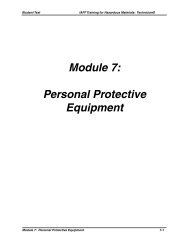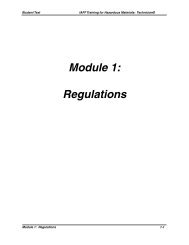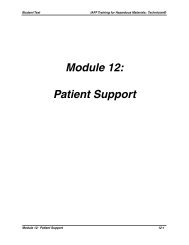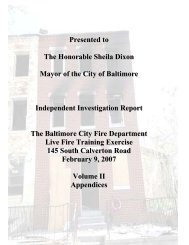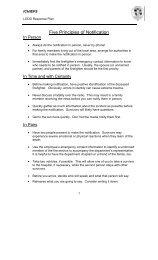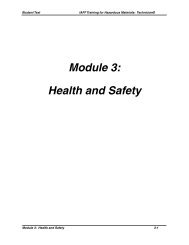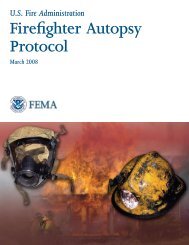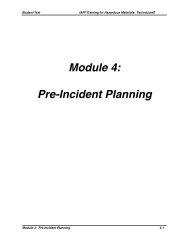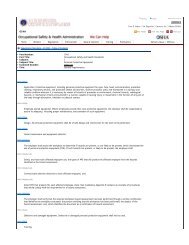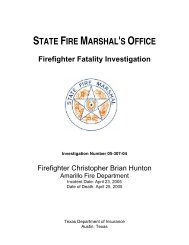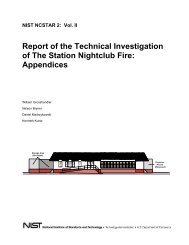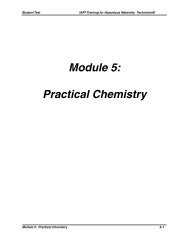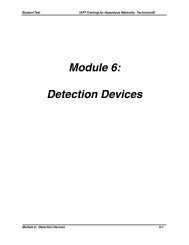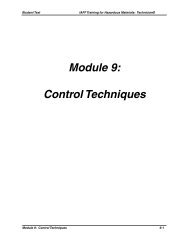Pension Handbook - International Association of Fire Fighters
Pension Handbook - International Association of Fire Fighters
Pension Handbook - International Association of Fire Fighters
You also want an ePaper? Increase the reach of your titles
YUMPU automatically turns print PDFs into web optimized ePapers that Google loves.
<strong>Pension</strong> Boards and Trustees<br />
<strong>Pension</strong> Board<br />
A pension board is responsible for making decisions<br />
regarding a pension plan. Each public pension board is<br />
different, with variances in board composition,<br />
responsibilities and meeting rules. The duties and<br />
responsibilities <strong>of</strong> a pension board shall include, but not<br />
necessarily be limited to, the following:<br />
To interpret the provisions <strong>of</strong> the plan and answer all<br />
questions on the plan.<br />
To determine all questions relating to eligibility and<br />
participation.<br />
To determine and certify the amount <strong>of</strong> all retirement<br />
allowances or other benefits.<br />
To establish uniform rules and procedures to be<br />
followed for administrative purposes, benefit<br />
applications and all matters required to administer the<br />
plan.<br />
To distribute to participants, at regular intervals,<br />
information concerning the plan.<br />
Individual Trustees<br />
Individual trustees are personally responsible to<br />
administer the pension plan in the best interests <strong>of</strong> the<br />
members.<br />
The legal obligations and responsibilities <strong>of</strong> pension<br />
trustees are extensive and include the following:<br />
Act honestly, in good faith and in the best interests <strong>of</strong><br />
the members and former members and any other<br />
persons to whom a fiduciary duty is owed.<br />
Exercise the care, diligence and skill that a person <strong>of</strong><br />
ordinary prudence would exercise when dealing with<br />
the property <strong>of</strong> another person.<br />
A plan administrator and all trustees on a board <strong>of</strong><br />
trustees must not knowingly permit their own<br />
interests to conflict with their duties and powers in<br />
respect to the pension plan.<br />
<strong>Pension</strong> plan investments and financial decisions must<br />
be made in the best financial interests <strong>of</strong> plan<br />
members, former members and other plan<br />
beneficiaries.<br />
To receive and process all applications for benefits.<br />
To authorize all payments from the fund, and to notify<br />
the disbursing agent, in writing, <strong>of</strong> approved benefit<br />
payments and other expenditures arising through<br />
operation <strong>of</strong> the plan and fund.<br />
To perform actuarial studies and valuations at<br />
least as <strong>of</strong>ten as required by law, and make<br />
recommendations regarding any and all changes<br />
in the provisions <strong>of</strong> the plan.<br />
To perform such other duties as are required to<br />
prudently administer the plan.<br />
An attorney, typically from the jurisdiction, gives<br />
advice to the pension board in all matters<br />
pertaining to its duties in the administration <strong>of</strong><br />
the fund whenever requested. The attorney will<br />
also represent and defend the pension board as its<br />
attorney in all suits and actions that may be<br />
brought against it and bring all necessary suits<br />
and actions in its behalf. However, the board may<br />
also employ independent legal counsel at the<br />
fund’s expense, together with such other<br />
pr<strong>of</strong>essional, technical or other advisers, as the<br />
board deems necessary.<br />
10


